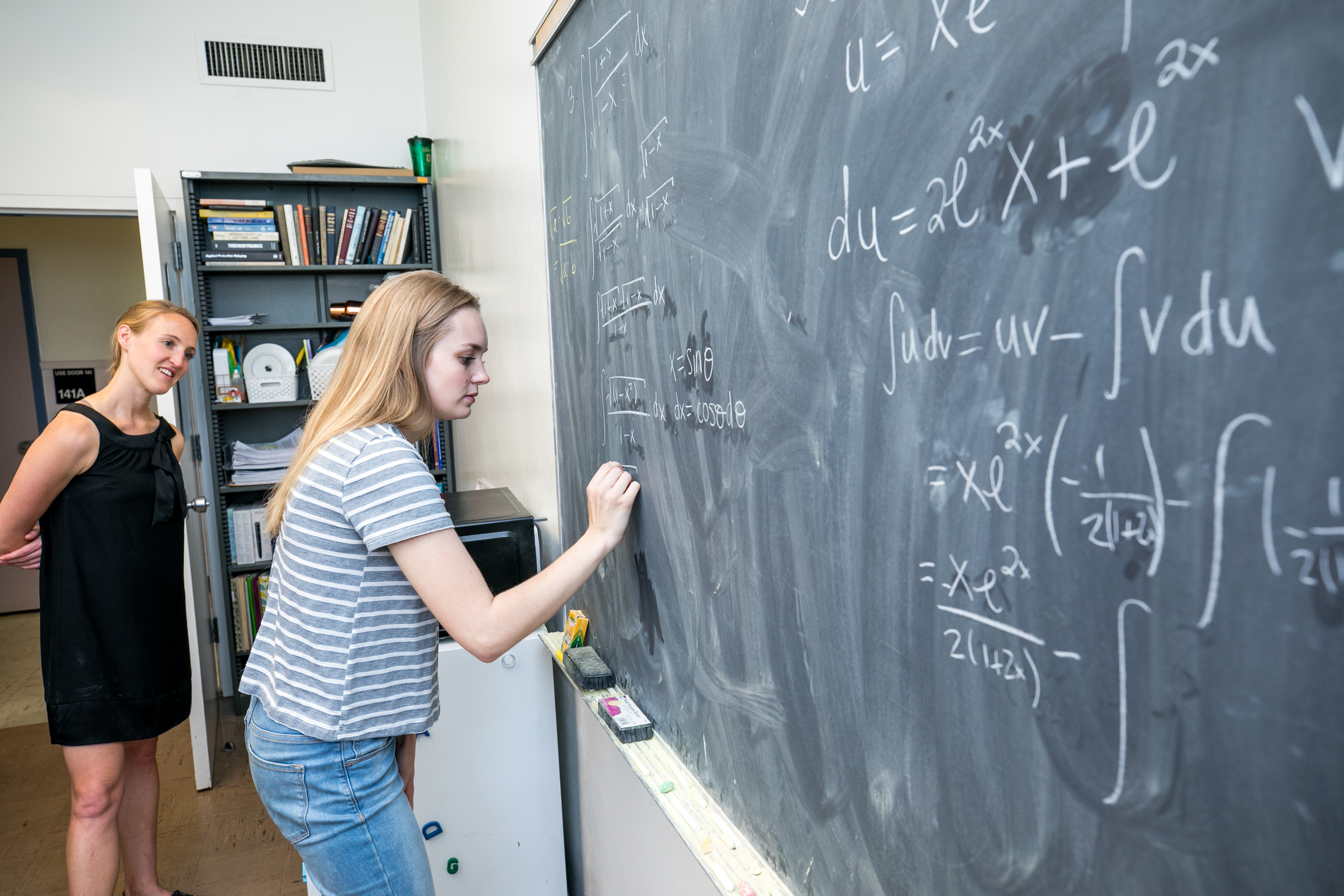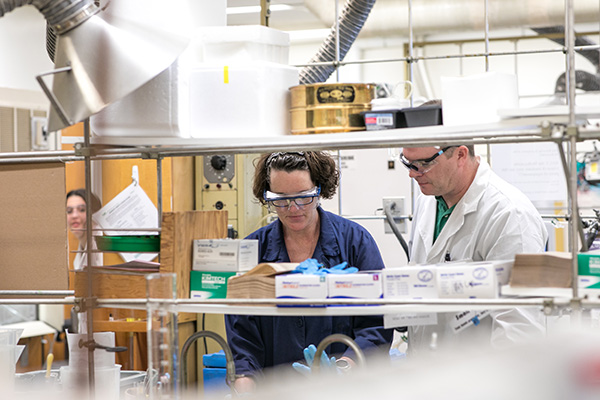 Professor Abigail Higgins, left, watches as student Jessi Minners works out an equation as part of their summer research. (Sacramento State/Andrea Price
Professor Abigail Higgins, left, watches as student Jessi Minners works out an equation as part of their summer research. (Sacramento State/Andrea PriceThis summer, Sacramento State chemistry student Brian Bayer is absent from the aisles of Home Depot, where he has worked helping customers find the perfect power tool or light bulb.
Instead, Bayer will be paid to work on a research project that can further his science education and future career, and also ultimately help prevent the spread of the AIDS virus.
He is one of about 60 students in Sac State’s College of Natural Sciences and Mathematics who have been awarded stipends from various programs to work on summer research projects with their professors.
More students than ever are involved in the college's paid summer research programs, said Mary McCarthy-Hintz, chemistry professor and co-director of the Science Educational Equity Program. Most of the research is part of this year’s Summer Undergraduate Research Experience (SURE) program, which pays students $500 a week to work with faculty mentors on new and ongoing projects.
“The work helps students find their career paths and achieve their goals,” McCarthy-Hintz said.
Among other things, “they learn math and field skills, troubleshooting and critical thinking,” she said. The stipend programs extend 10 weeks, but many participating students will continue working on the research projects into the fall semester and beyond.
This summer’s funded projects delve into a wide range of topics, from ocean mapping and modeling to insecticide resistance in house flies.
Mathematics professor Abigail Higgins will be working with her student, Jessi Minners, on a new project investigating how students use internet platforms to complete their homework assignments.
“Students are studying in a completely different way today,” including accessing online tools such as Desmos and Khan Academy to tackle assignments, Higgins said. “But we don’t really know how they are using these resources.”
She wants to know whether the tools enhance learning or detract from it, allowing students to cut corners or cheat on their homework. “I see a lot of productive use of these resources," Higgins said, but worries that overuse of the platforms could hamper learning.
Minners said she uses “lots of online applications” for homework, but does so judiciously.
“I use them mostly when I get stuck,” she said, otherwise relying on her notes from class and her textbooks to learn the information. Other students may be “just tracing the answers,” failing to fully process the material and resulting in poor grades on tests, said Higgins.
For the study, the research duo will invite students into a classroom setting, asking them to bring books, notes, online resources and other tools that they typically use to study. The researchers will assign problems, observe the students as they try to solve them and assess the outcome.
The research results, said Minners and Higgins, may allow professors to structure assignments more effectively and refer students to the best online and offline resources for studying, potentially improving success rates in the classroom.
“There’s almost no literature published on this yet, so it’s exciting,” Higgins said.
Bayer’s work will take place in a lab, where he will work under the supervision of chemistry professor Katherine McReynolds.
 Chemistry Professor Katherine McReynolds, left, confers with student Brian Bayer on research into development of therapeutic agents that might block the transmission of HIV. (Sacramento State/Andrea Price)
Chemistry Professor Katherine McReynolds, left, confers with student Brian Bayer on research into development of therapeutic agents that might block the transmission of HIV. (Sacramento State/Andrea Price)Since 2016, McReynolds has been working on a study funded by the National Institutes of Health on therapeutic agents that have the potential to block transmission of HIV, the virus that causes AIDS.
Current treatments for HIV infections, mostly anti-retroviral drugs, can reduce levels of the virus in the body but fail to eradicate it, leading to recurrences if therapy is interrupted.
McReynolds is making sugar-coated chemical substances that bind to the HIV virus to prevent transmission. These polymers could be incorporated into in a gel or condom coating to stem the spread of the virus.
“Currently there are no FDA-approved drugs in this category, so this would be a really great thing,” she said.
For Bayer, who has a 12-year-old son, the opportunity to make money this summer while working in his chosen field is “monumental,” he said.
The project is “cutting-edge stuff,” Bayer said. “It’s novel, and it’s absolutely important. And it helps give me the experience I need to be a viable employee in the work world” once he graduates.
“Money is a major stressor for most college students, especially older ones like me, with children,” Bayer said. “If I didn’t have this opportunity I would have to work full time off campus, plus do the research on a pro-bono basis.
“There is no way I can describe how elated I am to be a part of this,” he said. “I couldn’t be happier.” – Cynthia Hubert
